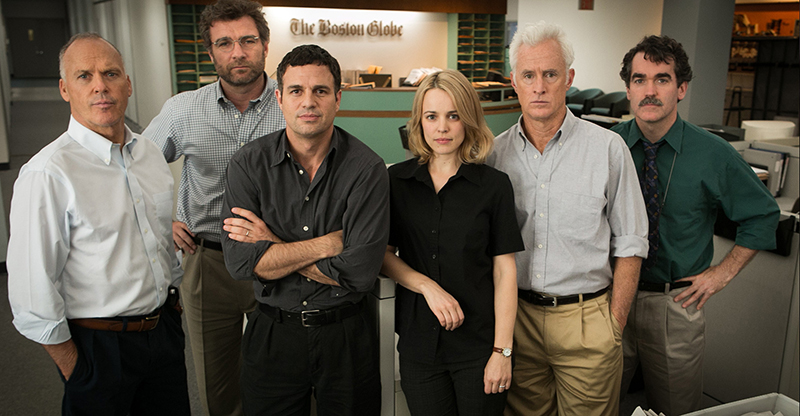
The cast of “Spotlight.” Photo courtesy of Open Road Films
(RNS) A few months before Robert W. Finn became bishop of the Catholic Diocese of Kansas City-St. Joseph, I interviewed him for The Kansas City Star about the challenges he might face when he replaced the much-loved Bishop Raymond Boland.
Of course, neither Finn nor I had any way of knowing that a decade-plus later he would resign in disgrace, having been convicted of the misdemeanor crime of failing to notify law enforcement authorities about a suspected child-abusing priest in the diocese — a priest who now spends his time in prison.
I looked back on that 2004 interview recently and was shocked by the difference between Finn’s words and his later actions (or, more to the point, inactions) especially in light of the recent movie “Spotlight,” which was nominated for six Academy Awards Thursday (Jan. 14) including best picture and best original screenplay.
The movie describes how the Boston Globe’s investigative reporting team uncovered widespread child abuse at the hands of priests and a cover-up by Boston’s then-archbishop, Cardinal Bernard Law. Indeed, the film ends with a long list of cities around the world in which this abuse scandal played out, and Kansas City is on that list.
RELATED STORY: ‘Spotlight’ movie explores journalists’ Catholic abuse coverage, loss of faith (COMMENTARY)
At one point Finn talked to me about the need for the church to “transform the world and the culture.” I asked him what he meant, and he noted that he recently had met with some Protestants about a coalition against pornography. He described porn as a “growing addiction, especially because of the Internet.”
So Finn’s own words show he knew what to be on the lookout for. But when the Rev. Shawn Ratigan’s laptop computer showed up in the hands of diocesan officials with child porn on it, neither Finn nor anyone else in the diocese notified law enforcement authorities. Instead, Finn tried to cover it up by fixing it from the inside. Which is exactly what authorities in Boston did — year after year and priest after priest.
Finn went on to describe how Pope John Paul II had noted that we live in a “culture of death.” Perhaps if he had cut out the words he said next and pasted them on a sign on his desk he might have remembered them when confronted with the Ratigan case:
“A ‘culture medium’ would be like the dirt that something is planted in. If something’s growing in that, it just very unconsciously absorbs this through the roots and we start losing our sensitivity to what is wrong, what is dangerous, what is poisoning us.”
So Finn is gone and the new bishop, James V. Johnston Jr., is asking the church to repent and “to look honestly at who we are, how we’ve failed and the people we’ve wounded.” It’s the right attitude. But whether it will prevent a repeat of the crimes the diocese has witnessed is impossible to predict.
In a 2015 column I wrote for the National Catholic Reporter, I made the point that an informed citizenry needs the kind of investigative journalism represented by the Spotlight team in Boston. But newspapers are shrinking and it’s unclear how the public will learn about future crimes and sins that public (to say nothing of religious) officials want kept secret.
This diminution of investigative newspaper reporting places on all citizens — especially on members of faith communities — a deeper responsibility to seek out the truth and to insist on transparency from authorities. So far there’s little evidence that the public understands this. But if citizens fail, it will put at risk our most cherished political and religious institutions, and endanger our children.
When I asked Finn in 2004 what the sexual abuse scandal had taught him and the church, his answer reflected knowledge I wish he had remembered when it came time to do the right thing:
“I think it will always change us in terms of being more vigilant. … I don’t think that we can ever become complacent or so confident that that’s all taken care of because these problems are deep-seated and there’s a lot of denial, there’s a lot of hiding and secretiveness and so forth.”
What all of us need to remember is that sometimes the denial, hiding and secrecy happen at the highest levels of authority.
(Bill Tammeus, a former columnist for The Kansas City Star, writes the daily “Faith Matters” blog for The Star’s website. E-mail him at [email protected]. This commentary is part of the KCPT and Hale Center for Journalism project “Beyond Belief,” a series of stories and discussions about faith and the different faith traditions in Kansas City.)




